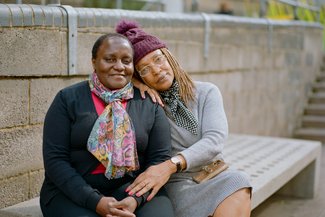
Cost of Living Crisis: Impact on Women At-Risk
Nia Clark, Senior Research and Engagement Officer, explores the gendered impact of the worsening cost-of-living crisis and the effects it is having on women with multiple unmet needs.

13 Dec 2022
By Cynthia Otote, Communications Officer
As the cost-of-living crisis worsens, its effects continue to take a toll on the most vulnerable groups within society. While women with multiple unmet needs face issues such as increased anxiety and stress and vulnerability to domestic abuse, the services supporting them are facing their own numerous difficulties.
Public and voluntary sector services, such as housing, health and social care, provide vital frontline support for many women and girls – particularly for those with multiple unmet needs. Yet pressures from the rising cost-of-living mean that frontline organisations are trying to perform their duties while also dealing with:
In this blog, we will explore the pressure of these circumstances and the help services need to survive.
Given the deepening challenges brought on by the cost-of-living crisis, it is no surprise that frontline services are experiencing an increase in need amongst those they support, with many reporting that the women and girls they are supporting face greater vulnerability than before.
Reports from women’s organisations such as the End Violence Against Women Coalition, Imkaan and Rape Crisis England & Wales emphasise that the cost-of-living crisis is particularly acute for survivors of domestic abuse. Last month, a joint statement on the impact of the cost-of-living crisis on women facing abuse highlighted the increased demand for specialist services, speaking of “a dramatic increase in referrals both in number and complexity, with the majority coming from women struggling with the rising cost of living.”
Indeed, during the first quarter of 2022, Hestia saw a 30 percent increase in demand for domestic abuse refuge spaces while recent data from Refuge’s frontline staff found that the cost-of-living is impacting survivors’ mental health. Service staff shared that survivors are being pushed into debt or further debt as income from work and/or benefits is not enough to cover essentials.
Women who are already experiencing high levels of poverty, such as those with no recourse to public funds, are also suffering. Speaking at our most recent Community of Practice meeting, as part of our Transforming Services project, one practitioner shared:
“What we’ve seen with the cost-of-living increase is that destitution has been massively heightened. For many women that are relying on charitable support… that financial support is no longer meeting their financial [outgoings].”
As women and girls with multiple unmet needs are pushed further into hardship, frontline voluntary sector organisations are often the places they turn to. However, these services themselves are also struggling under the effects of the crisis.
Charities need to manage their own rising costs and face worries about the future. A recent survey by the Charities Aid Foundation found that 82% charity leaders are concerned about the increased cost of utilities, including energy bills, rent and fuel, while 65% of charity chief executives are worried about the higher cost of stock, equipment and supplies.
At our recent Community of Practice meeting, one practitioner explained:
“Services are under great pressure, being impacted by the cost of their own heating, the cost of keeping the services and buildings open for people to come into… Nobody wants to sit in a cold office or have people come into a cold community centre.”
On top of this, wage inflation is making it even more difficult to recruit and retain staff, meaning services are dealing with capacity issues and losing out on talent:
“We’re losing valuable experience and that really puts pressure on services.”
After ten years of austerity, the impact of covid-19 and now the cost-of-living crisis and recently confirmed recession, services are struggling to survive. Sadly, the cost-of-living crisis shows no signs of relenting. Given this, there is an urgent need for long-term, sustainable funding for specialist women and girls’ services to ensure frontline support continues to be available to those who need it most. Without government support, services and the women and girls they work with will continue to suffer.

Nia Clark, Senior Research and Engagement Officer, explores the gendered impact of the worsening cost-of-living crisis and the effects it is having on women with multiple unmet needs.

The cost of living crisis will affect us all, but women and girls with unmet need will be disproportionately impacted. This first installment in our cost of living series looks at the policy context of the crisis.